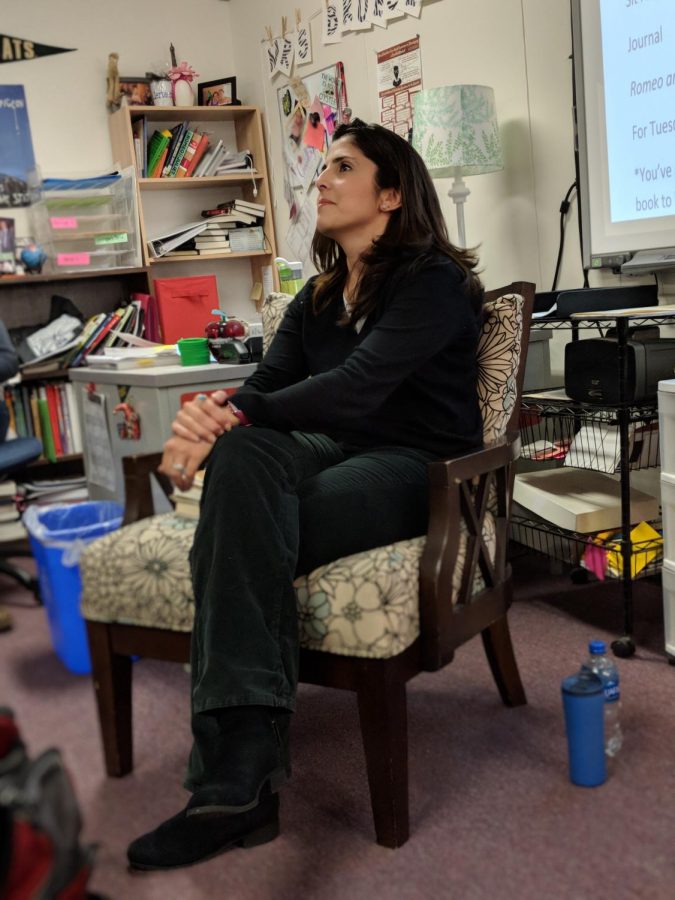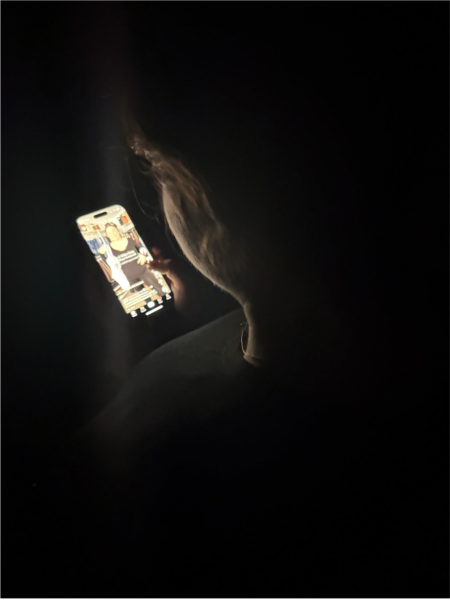Acclaimed foreign correspondent and author shares experiences with students
Atia Abawi, an author and journalist, visited Ms. Bruesewitz’s classroom on March 9 to tell stories of her time as a foreign correspondent and journalist. Abawi has worked with many news outlets, such as NBC and CNN, and thus had many experiences to share with her audience.
Abawi started the visit by sharing how she got her start in journalism.
“I had wanted to be a journalist since I was seven,” Abawi said. “I was deciding who to tell about my dream, and I finally decided to talk to my AP Journalism teacher. He called everyone up one by one and said, ‘What do you want to do with journalism in your life?’ He was the first person I was going to tell, aside from my parents. My parents told me it was far fetched. They thought, as I was a woman, an ethnic woman, that I shouldn’t do it.”
This was a common theme in Abawi’s talk: how her ethnicity and gender made it more difficult for her to reach her dreams. She discussed how she faced disappointment frequently, including when she confided in her journalism teacher.
“I put my vulnerability out there and said I wanted to be a foreign correspondent,” Abawi said. “He said, ‘Don’t bother, you’ll never make it. You don’t have it in you.’ At seventeen, I was crushed. I had already picked my major in journalism.”
However, Abawi went on to become a foreign correspondent, visiting more than 40 countries, including Israel, during former President Obama’s historic trip, and Myanmar. Myanmar in particular resonated with her.
“We had to sneak in there, the cameraman and I,” Abawi said. “We could have been imprisoned, so we had to pretend to be on holiday. I was so scared, because I could never see my family again. But then, I saw the smiley faces of the people who had been cut off from the world, and it was so beautiful.”
Abawi explained how after seeing all this tragedy in the world, she still believes in the goodness of man everywhere.
“We have both hunters and helpers inside of us, and we have to choose which one we want to be,” Abawi said. “There are people who choose to give refugees fake life jackets, so they drown. There are human traffickers, sex traffickers. People who take children who wash up on the shores of Greece and such. But, in bad situations, always look for the helpers. In a situation like the refugee crisis, there are always people who are going out to help the refugees.”
Abawi has faced some dark events herself. When she started working at NBC, a former friend who worked under her threatened her in severe ways.
“First he tried to undermine me professionally, and that didn’t work, because everyone knew he had a reputation for things like that,” Abawi said. “Then, he put my safety at risk. He tried to get me gangraped by the local guards.”
According to her, guards from CBS heard this plan, and warned NBC about it. When asked if the man was punished, Abawi shared that the punishment was not as harsh as she had anticipated.
“I feel bad saying this, because I loved working for them, but NBC paid him off to leave quietly [after the incident],” Abawi said. “The first time that I mentioned that he tried to undermine me professionally, they had a male boss come over, and they went to a meeting together. I assumed he was going to be punished, but they came out arm in arm. The boss had rewarded him. I think rewarding him, that’s what gave him the audacity to go a whole lot further.”
Abawi, whose family is Afghani, discussed how her heritage affected her in addition to her gender. When a student asked about the effect of 9-11 on her Afghani identity, she responded that it was especially hard because it had come just after she had finally felt comfortable with who she was.
“People would tell me that I shouldn’t tell people that I was Afghani, that I could pass as Argentinian,” Abawi said. “Even my mom tells me, to this day, to hold back. She said people would attack me.”
However, her dual-citizenship has had an positive effect on her career. As she feels both accepted and alienated in both America and Afghanistan, she says visiting other countries doesn’t seem as unfamiliar as it might otherwise.
“I’m a dual citizen, but I call myself a dual foreigner,” Abawi said. “I feel like I belong and don’t belong everywhere, so I can go to Korea, Israel, France, and while I feel like an insider. I can also feel like I belong there, because that’s how I feel everywhere, like I don’t belong and do belong.”
Being an author has been a newly recognized dream of Abawi’s. She writes about places and people she’s seen, such as the landscape and people of Afghanistan and wants to show people a side of the country they don’t see in the news. When asked why she writes for a young adult audience, she responded that young people are more open.
“You guys come from a generation where you know more things, are exposed to more, than other generations,” Abawi said. “Young people want to learn more about other people. I see way more diversity in YA books than I do in adult fiction.”
Abawi has written several books, including The Secret Sky, which is about two young adults in a Taliban influenced Afghanistan. Her most recent novel, A Land of Permanent Goodbyes, follows the journey of a young Syrian refugee fleeing Syria. Abawi also has a short story in Hope Nation, which is a collection of stories about teens facing oppression.
Abawi says that even though she had her dream of being a journalist at the young age of seven, her new dream of being an author is proof that you can discover a new goal at any time in your life.
“No matter what your dreams are, they’re actually really reachable,” Abawi said. “I say that because I’ve had both my wishes come true, being an author and a journalist. I got advice once that was really cliche, but it was true: never give up. You’ll reach your dream. I was a foreign correspondent even though my journalism teacher said I couldn’t be. He was wrong. I made it, and so can you.”












